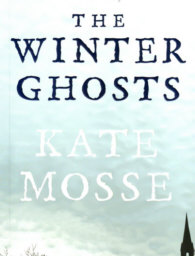Whoa! I thought as I read that last sentence. Why should one trample one's own heart by a decade of
mourning for a loved one? Especially when one could enliven one's heart with all the good memories of
experiences of that loved one? As Eleanor Roosevelt is reputed to have said, "Many people will walk
through your life, but only true friends will leave their footprints on your heart." These are the footprints one
can benefit from: the loving acts of the beloved friend who has passed, which leave their loving traces
behind like footprints on one's heart.
It was so bad for Freddie at the beginning of this novel that the telegram he received of George's death
which read, MISSING IN ACTION. PRESUMED DEAD, would be a suitable metaphor for Freddie's own
life for the past decade. Missing in action was George, in the war. Missing in action was Freddie, in life after the war. And now as the novel progresses, Freddie
is also missing in action in a very real way, and could be presumed dead by others. Will George's epitaph
become's Freddie's? Perhaps Freddie's cenotaph will read, "Known unto God", Rudyard Kipling's words
which grace the unknown soldiers tombstones.
Freddie was headed into a blizzard which would shake up his life, tear him loose from George, and weld
him together with Fabrissa, but he drove on aware only of the outside air getting colder and colder. It occurs
to me how difficult it is avoid common metaphors like falling and dropping for decreasing temperatures, but
consider that in a century or so, maybe even now, children will ask what does this sentence fragment mean:
"the mercury was falling", because mercury thermometers are almost nowhere to be found today, already
having been replaced by the ubiquitous red alcohol which forms the red line our 21st century analog
thermometers, themselves being replaced by digital thermometers whose numbers may decrease or increase
but they do not literally "drop" or "fall" or "rise" or "climb" as they do in our old-fashioned red- and silver-line thermometers(1).
Overcome by the cemeteries and war memorials for young men dying in battles like his brother George
did, Freddie had to stop, er, kill, the engine of his Austin on a remote mountain road.
[page 43] I pulled over and killed the engine. My fragile good spirits scattered in an
instant, replaced by familiar symptoms. Damp palms, dry throat, the familiar spike of
pain in my stomach. I took off my cap and leather gloves, ran my fingers through my
hair and covered my eyes. Sticky fingers smelling of hair oil and shame, that grief
should still come so easily. After all the talking cures, the treatments and kindness, the
kneeling at hard wooden pews at evensong, that I still carried with me a cracked heart
that refused to heal.
Ah me, that acne should come to a teenager! Cher pitie! A Dr. Ellerbroeck wrote in a short essay in the
Mother Earth News back in the 1970s that, when he showed teens how to change acne from a noun (a reified
condition) into a transitive verb (a fluid process), their acne dried up and went away. All they needed was
to take control of their condition by replacing their hopeless plaint, "I have acne" to "I am acne-ing." Notice
how Freddie complained "that grief should still come so easily." To be honest, he should have replaced
"talking cures" with "talking non-cures". He needed a strong dose of accepting his part in holding onto his grief. He could turn his grief from a thing into a process by saying, “I have been grieving, up until now.” That deft application of the limitation eraser(2) could set him on the right path, a path which replaces his stagnant grief with a living grieving process and adds it to his personal history from now on. Like the teenagers whose faces cleared up when they stopped acne-ing, Freddie’s grief will clear away, remaining only as a memory relegated to his past life.
In 1978 I learned the phobia and grieving processes from Bandler and Grinder in workshops I attended. I learned how the cure for one process can be had by switching to the other process. To grasp how this works, one needs to understand the First Person and Third Person processes for remembering an event.
In the
First Person, one sees one's self inside the image of one's body in the memory. This is the phobia process.
Whatever they might be feeling in the memory, they will feel in the present moment. If they see a snake at
their feet, ready to strike at their ankles, their heart will race, their respiration rate increase, and they will feel
the complex set of feelings we call fear. What I have just described, let us call that the phobia process.
In the Third Person, one sees one's self standing apart from one's body (like in a
movie) and watching what happens. Let us call that the grieving process. They will have a feeling about the
situation, perhaps interest, wanting to see if the snake just slithers away, which it indeed might if one stands
still and quiet. Note: standing still and quiet is not an option for someone using the First Person process (the
phobia process), all of which makes them liable to scream and move suddenly, provoking the snake to strike.
For reasons which will become clear in a bit, let's call the Third Person process, the grieving process.
Using the Third Person way of remembering, Freddie remembers all the good times he had with his
brother George as though he were watching a movie of the two of them together, perhaps we could call the
movie, "The Family Life of George and Freddie", and Freddie, watching this movie, can only feel bad,
knowing that he can never have those good times with George ever again. He is stuck, clearly up to his
hiking boot tops, in the grieving process, unable to extract himself. He even disowns responsibility for what
he is actively doing by saying "grief still comes so easily." Freddie has, in effect, nominalized the process
of grieving, changed it from a living action (a verb) into a reified condition (a noun).
But soon he meets Fabrissa, he falls in love, and when she later goes away, missing in action, what does
Freddie do? He keeps seeing himself with Fabrissa (First Person) and feeling the love he felt for her when
she was with him. In other words, Freddie is now using the phobia process to create a good feelings in
himself about his loved one. He is seeing himself sitting next to Fabrissa, perhaps, looking to his left, right
into her eyes, and feeling loved.
What if Freddie began using the phobia process whenever he thinks of George from then on? Then
instead of feeling bad, he will begin feeling good. Maybe that is indeed what happens as Freddie begins to
focus more on Fabrissa and less on George toward the end of the novel.
(3)
When Freddie found lodging at Madame Galy’s Inn, she nursed him back to health and invited him to go to the Feast of St. Etienne’s at the Town Hall. In Nulle, a tiny village in a remote mountainous section, there were few
clues as to whether Freddie was in the 13th Century or the 20th Century. While being introduced, Freddie offered his hand to Guillaume Marty, a friendly man who welcomed him to the feast, but who did not offer his hand in return. This would be a clue that perhaps Freddie was not in modern times, but there were scant
other clues, since this was an ancient feast which was celebrated as in olden days, but modern day
handshakes would remain even though ancient flambeaux replaced more modern lighting and everyone was in ancient modes of dress. When he sat down next to Fabrissa, it was love at first sight as
Freddie was hit by a time wave of feeling from the future which sent his pulse racing.
[page 105] Slowly, we managed to find a way of talking to one another, Fabrissa and
I. With the help of the sour, rich wine, my pulse slowed to its usual rhythm. But I was
aware of every inch of her, as if she were giving off some kind of electric charge. Her
white skin and blue dress and her hair the color of jet. I felt clumsy in comparison,
awkward. I took refuge in innocuous questions and managed, against the odds, to keep
my voice steady and calm.
In an eerie comment during Freddie's relating to her the effect that the death of his brother George had
on him, Fabrissa explains her own presence in Freddie's life, which Freddie misses.
[page 122] "The dead leave their shadows, an echo of the space within which once they
lived. They haunt us, never fading or growing older as we do. The loss we grieve is not
just their futures but our own."
At this point it becomes clear to the Reader if not to Freddie that the Feast is happening some six hundred years in the past and that
Freddie has left his body in a fevered sleep at Chez Galy to join with these winter ghosts, ghosts who have haunted
these hills for centuries and have now chosen Freddie as their savior. The plot of this novel is “Freddie the hero comes to town.” Freddie has come to save two sets of residents of the town, the quick and the dead, by locating the bones of the winter ghosts so that they may have a proper burial and stop troubling the still-living residents.
When Fabrissa tells Freddie her story, it contains the story of St. Etienne's Feast which matches what
Freddie had just experienced, two soldiers coming in and a brawl ensuing. Fabrissa and others escaped the hall
through a tunnel and took refuge in a large cavern in the mountains which the soldiers eventually found and
blocked up the exits from. As she leaves Freddie, she gives him his marching orders, "Come and find me"
and "Find us. Then you can bring us home."
We begin to understand the spirits in the mountains as the source of the book's title as Guillaume who
came with his father to repair Freddie's Austin translated his father's old words.
[page 212] "He says that although they sing of the Cers winds crying in the trees when
the snows come, it is the voices of those trapped in the mountains." He hesitated. "The
winter ghosts."
This novel is a ghost story with a pedigree, with a long history which unwinds before our eyes as we
follow our hero Freddie on his path to redemption as he redeems the long-dead of the mountains and helps
bootstrap the region to a full and vibrant life in the modern age.
---------------------------- Footnotes ----------------------------------------- 
Footnote 1.
Note: given that the first barometers used a column of mercury to indicate the atmospheric pressure, "falling mercury" could
also be used to refer to an approaching storm because the higher the winds the lower the barometric pressure. Mercury's low vapor
pressure made it the only suitable liquid for barometers which have a vacuum over a column of liquid, and mercury's heaviness made for a short 30" column of mercury to represent average atmospheric pressure at sea level. Water will rise 34 feet, as it is so much lighter than mercury, which is why pumps depending on suction can only pump water from wells less than 34 feet below the surface of the pump.
Return to text directly before Footnote 1.
~~~~~~~~~~~~~~~~~~~~~~~~~~~
Footnote 2.
The limitation eraser is a way of releasing one's limitation as soon one recognizes its presence. One simply pauses (after
recognizing one has stated a limitation) and adds the closing phrase to the sentence "up until now". The comma indicates the
need for a pause to take a deep breath before saying up until now. Without the pause, one can hold onto one's limitation
because one's inner state is not changed. See Matherne's Rule No. 9 for further explication.
Return to text directly before Footnote 2.
~~~~~~~~~~~~~~~~~~~~~~~~~~~
Footnote 3.
Bandler and Grinder in the workshop explained how one can use the Third Person or grieving process to cure someone of a
phobia. By leading the phobic to switch from First Person to Third Person, they become able to watch peacefully while their
lifetime phobic event is played out. With this example of one-time learning, the dreaded phobic event will no longer contain
the charge of fear it did before, and they will be cured.
Return to text directly before Footnote 3.
~~~~~~~~~~~~~~~~~~~~~~~~~~~
~^~
Any questions about this review, Contact: Bobby Matherne
~~~~~~~~~~~~~~~~~~~~~~~~~~~~~~~~~~~~~~~~~~~~~~~~~~~~~~~~~~


== == == == == == == == == == == == == == == ==
22+ Million Good Readers have Liked Us
22,454,155
as of November 7, 2019
Mo-to-Date Daily Ave 5,528
Readers
For Monthly DIGESTWORLD Email Reminder:
Subscribe! You'll Like Us, Too!
== == == == == == == == == == == == == == == ==
Click Left Photo for List of All ARJ2 Reviews Click Right Bookcover for Next Review in List
Did you Enjoy this Webpage?
Subscribe to the Good Mountain Press Digest: Click Here!


CLICK ON FLAGS TO OPEN OUR FIRST-AID KIT.
All the tools you need for a simple Speed Trace IN ONE PLACE. Do you feel like you're swimming against a strong current in your life? Are you fearful? Are you seeing red? Very angry? Anxious? Feel down or upset by everyday occurrences? Plagued by chronic discomforts like migraine headaches? Have seasickness on cruises? Have butterflies when you get up to speak? Learn to use this simple 21st Century memory technique. Remove these unwanted physical body states, and even more, without surgery, drugs, or psychotherapy, and best of all: without charge to you.
Simply CLICK AND OPEN the
FIRST-AID KIT.

Counselor? Visit the Counselor's Corner for Suggestions on Incorporating Doyletics in Your Work.

All material on this webpage Copyright 2019 by Bobby Matherne






